 |
L'@ctu de l'ESIGELEC - IRSEEM |
 |
|
March 2016 - n°11
|
    |
|
Graduates in the news |

Normandy – March 2016 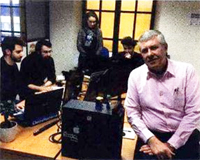 Launched by Éric Joyen-Conseil in 2015, Keyveo provides 3D modelling and augmented reality to enable businesses to improve their product presentations. Information systems for businesses, IT and robotics... Éric Joyen-Conseil is well known in the IT world, having worked as a commercial engineer since 1985. After graduating from ESIGELEC (in the class of 85) with a degree in IT and robotics, he worked for XEROX and then ECONOM, before embarking upon an entrepreneurial venture when he set up CPI/SOCRATE, a specialist information systems company. When his company ceased trading in 2014, he created a virtual reality and augmented reality start-up and founded Keyveo in 2015. The business 3D/4D (3D real time with a timeline), augmented reality, virtual reality and mobile applications… Keyveo offers solutions for all needs: SME, industry, the building and civil engineering sector, infrastructure and local authorities, e-commerce, products and the luxury goods market. The start-up serves its clients by producing 3D/4D models thanks to a real time (Babylon JS) 3D engine used for video games “We are developing this engine with a community of open-source developers. Our developer Julien Chenard is one of only three administrators for this engine in the world” explains Éric Joyen-Conseil. Keyveo’s technology has already won it a number of contracts such as the virtual tour and online public consultation facility for major construction projects taking place in the Le Havre conurbation and the real time 3D model of the Flaubert eco-district in Rouen. “In the case of the eco-district project, the model shows the different stages of the building work so we can see how the district will develop over the next ten years”. It’s a tool which can be used for presenting projects in the construction industry, and also in the areas of maintenance, training and operations “and facilitating decision-making”, explains the manager. Keyveo is also developing 3D tools for modelling the cartoon strip characters produced by Leblon-Delienne in Neufchâtel. Developments “We have adopted an international strategy”, says Éric Joyen-Conseil, whose aim is to become a European expert in his field: “by providing specific solutions”. www.keyveo.com 
29 February 2016 A world first: workwear enters the virtual fitting age The French start-up Fitle, which was founded in 2013, has just launched a cloud-based application to help consumers and employees to try on clothes and workwear virtually on their smartphone. The application calculates all the user’s measurements automatically. A young talent! In 2013, Charles Nouboué, a graduate of ESIGELEC (class of 2010), Centrale Paris and Essec (in innovative business management), working in collaboration with Gaëtan Rougevin-Baville, a graduate of the Ecole Polytechnqiue and holder of a Master’s in mathematics from Columbia University in the United States, founded Fitle, a start-up which looks set to be a big hit! And that would come as no surprise. Having raised 750,000 euros and secured almost 250,000 euros in public funding, the young Parisian start-up has just launched the concept of trying on clothing and workwear on a smartphone. This is a world first as there is no longer any need to use a virtual fitting room. “You download the Fitle mobile application. You sign up for our cloud-based service, through your Facebook account, if you wish. You follow the instructions given in the app and take 4 photos of yourself. You enter your size and then the application automatically calculates all your measurements and instantly creates your 3D avatar. You can then try an item of clothing on your avatar to see which size suits you best”, explains Charles Nouboué who, at the age of only 27, already employs a staff of around twenty employees. “We developed prototype versions, including one with Carrefour. But we only launched our free app on 25 February.” And success soon followed. The application already has 10,000 registered users, 15,000 items have been virtually tried on, 2,000 measurements have been issued and partnerships have been established with a dozen brands. (…) 
29 February 2016 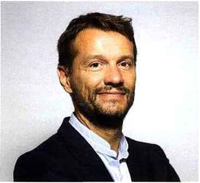 Pierre Clément was born in 1966 and is an ESIGELEC graduate (class of 89). He began his career in 1991 with Giat Industries (an armaments manufacturer) where he was involved in the development of the Leclerc tank. In March 1995, he joined France Télécom as Business Networks Project Manager. He was appointed Major Accounts Business Engineer in September 1997, was promoted to Major Accounts Sales Manager for the Rhône Alpes and Auvergne region in January 2001, and then, in July 2006, became Business Markets Manager for the same region. In March 2011, Pierre Clément was appointed Manager of Orange’s southern division, which covers the Midi-Pyrénées and Languedoc Roussillon regions. He joined the corporate and professional sector in February 2016 as Business Manager for France. 
26 January 2016
Video Making the Information Systems Manager a key strategic player 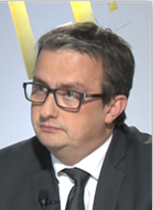 He works with major private and public stakeholders and has more than 20 years’ experience in IT consulting and systems integration. He specialises in IT strategy (blueprints, organisation, cost optimisation, working methods...) and in the implementation of major transformation projects. He is an ESIGELEC graduate (class of 93). He began his career in 1995 with the France Télécom group and then spent 13 years with Accenture, one of the world’s leading Consulting and Systems Integration companies. He joined EY in September 2013. 
22 January 2016
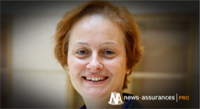 Delphine Asseraf is 41 years of age and an ESIGELEC graduate (class of 98). She began her career in 1998, joining Cetelem, a subsidiary of BNP Paribas, where she was responsible for web platforms. From 2004, she held various positions which involved responsibility for speeding up internet development in the Group’s 18 subsidiaries and also coordinated European internet partnerships. Five years later, she joined BNP Paribus as E-business Manager on the French retail banking market and then, in 2011, took on the remit of developing online banking, e-commerce and new methods of payment. In 2013, she launched Hello Bank! and was involved in creating the Paylib interbank payment system. In September of the same year, she joined Allianz France as Digital Manager in the digital and market management unit. 
November 2015 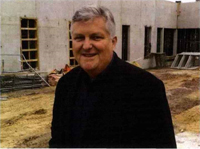 President of Seinari (Regional Innovation Agency), President of ESIGELEC and President of Gipelec Industries. Born Rouen 1961. ESIGELEC graduate (class of 1983). Founded the Serenlec company in 1986. President of the Rouen CJD (Centre for Young Business Leaders) between 1996 and 1998. Appointed President of Seinari in 2009. The reform of the labour code The only way we can get the economy back on its feet is by reforming the Labour Code and being more flexible. What we need is real social dialogue. We are at a turning point. Among both social partners and the business world, there is an awareness on both sides of the need to work calmly on a major project to reform the Labour Code. We have got to discuss matters if we are going to find solutions. Social partners and managers do not have a monopoly on the truth where the Labour Code of the future is concerned, it is an issue which should be shared. We’ve got to find levels of compensation and fairness. What about the Air France HR Manager’s proposal on flexible contracts? Why not? But, it is important to recognise that the economic model adopted by a company will only be accepted if the employees feel positive about their organisation and have a sense of well-being at work in a new economic model. We’ve got to stop looking backwards (...). |